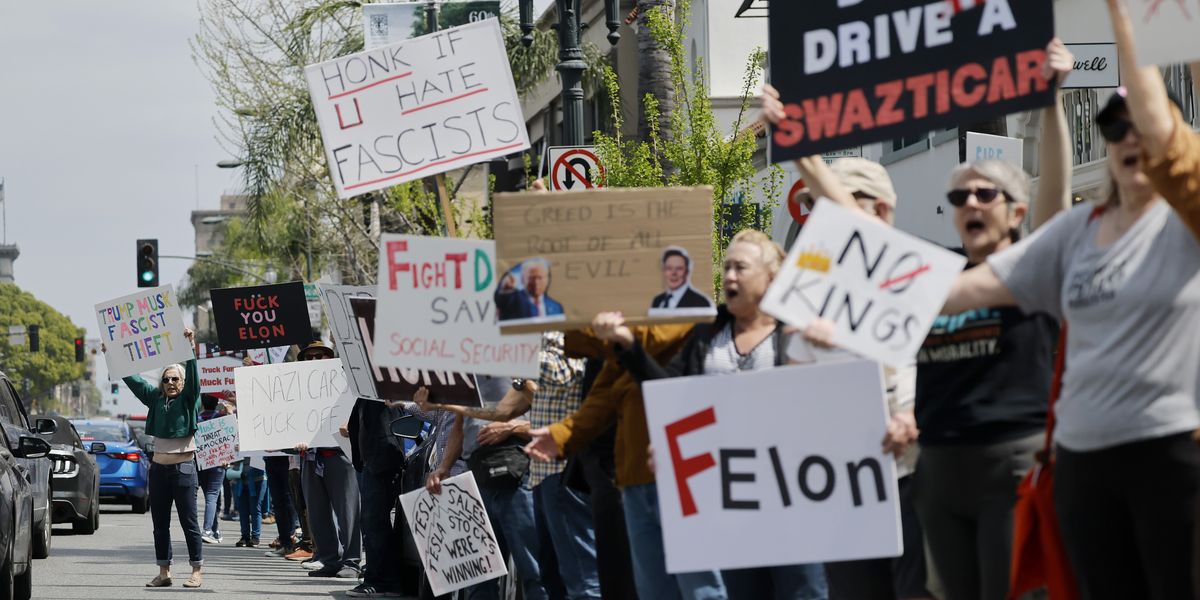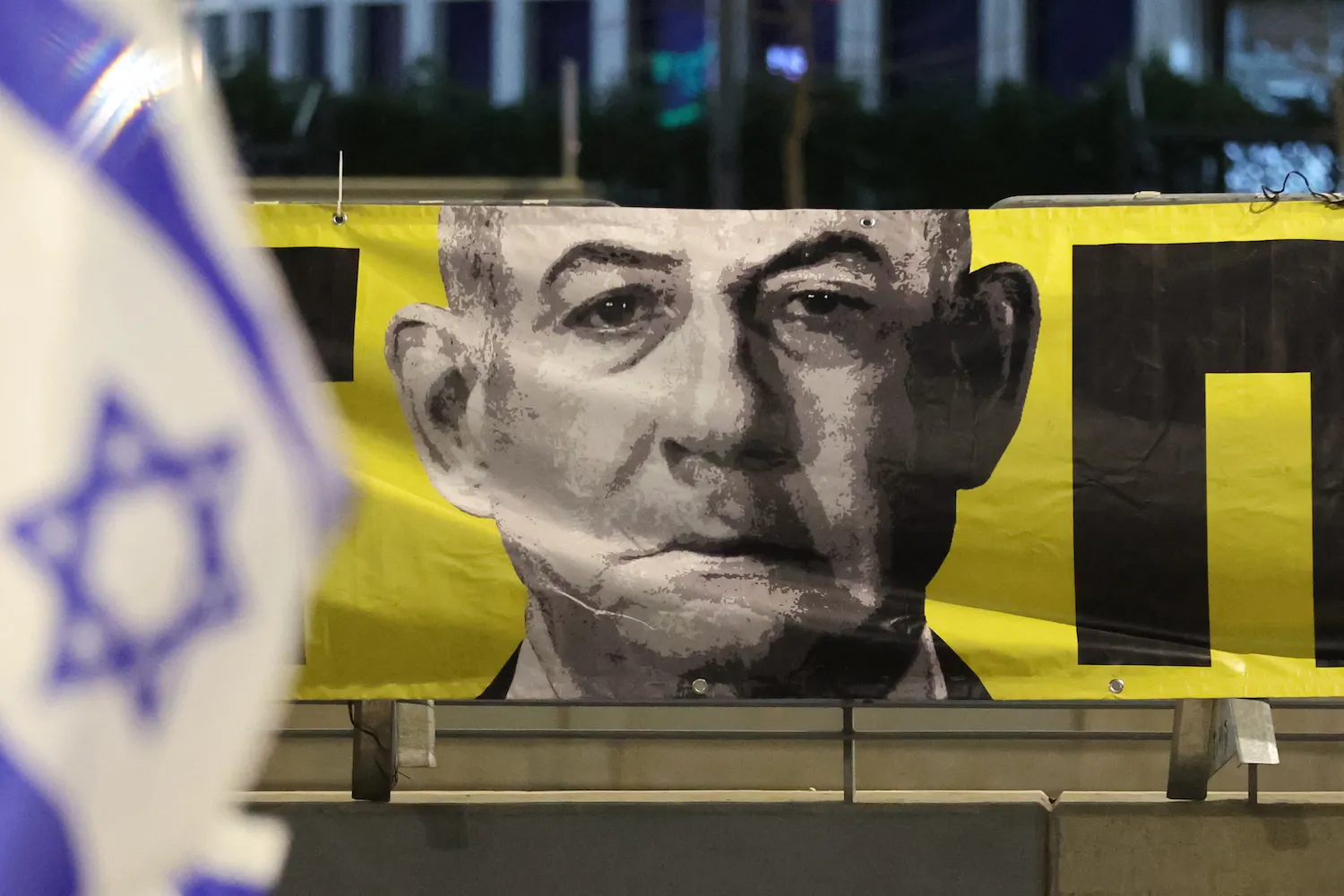
Wisconsin Rejected Billionaire Rule
April 2, 2025
Plummeting Global Tesla Sales Reveal Consumer Revolt Against Musk’s ‘Dangerous Far-Right’ Antics | Common Dreams
April 2, 2025Welcome back to World Brief, where we’re looking at the pressures behind Israeli right-wing politics, looming reciprocal tariffs on virtually all U.S. trading partners, and Chinese military drills near Taiwan.
Who Will Lead Shin Bet?
Israeli Prime Minister Benjamin Netanyahu withdrew his nominee to lead the country’s domestic intelligence agency, Shin Bet, on Tuesday due to conservative pushback. The about-face came less than 24 hours after Netanyahu picked retired Vice Adm. Eli Sharvit, a former commander of Israel’s navy, for the top spot.
Welcome back to World Brief, where we’re looking at the pressures behind Israeli right-wing politics, looming reciprocal tariffs on virtually all U.S. trading partners, and Chinese military drills near Taiwan.
Who Will Lead Shin Bet?
Israeli Prime Minister Benjamin Netanyahu withdrew his nominee to lead the country’s domestic intelligence agency, Shin Bet, on Tuesday due to conservative pushback. The about-face came less than 24 hours after Netanyahu picked retired Vice Adm. Eli Sharvit, a former commander of Israel’s navy, for the top spot.
Right-wing allies attacked Sharvit this week for previously protesting Netanyahu’s signature judicial reform legislation and for writing a column in January that criticized U.S. President Donald Trump’s decision to roll back climate change policies. Netanyahu and Trump are close allies.
Netanyahu heavily relies on his conservative colleagues to maintain a governing coalition. Israel’s decision to restart strikes in Gaza in March—effectively ending its cease-fire deal with Hamas—came in part due to far-right pressure, particularly from Israeli National Security Minister Itamar Ben-Gvir.
With Sharvit out of the running, it is unclear who Netanyahu may nominate next to lead Shin Bet. Last month, Netanyahu dismissed Shin Bet chief Ronen Bar due to a “persistent loss of professional and personal trust,” stemming partly from the agency’s failure to warn against Hamas’s Oct. 7, 2023, attack.
However, critics questioned the timing of Netanyahu’s decision to fire Bar, as it came shortly after the agency opened an investigation into alleged connections between the prime minister’s close aides and the government of Qatar. On Monday, Israeli police announced the arrests of two suspects—both top Netanyahu aides—in the so-called Qatargate scandal.
Any move by Netanyahu to replace Bar, though, defies an Israeli Supreme Court order freezing his dismissal until all petitions are heard, to conclude no later than April 8.
Meanwhile, public anger over Israel’s war conduct continues to rise. On Monday, Palestinians in Gaza held funerals for 15 medics and emergency responders killed by Israeli forces last month and left in a “mass grave,” according to a United Nations agency.
“This massacre of our team is a tragedy not only for us at the Palestine Red Crescent Society [PRCS], but also for humanitarian work and humanity,” PRCS said, calling the targeting of its medics “a war crime” under international law.
PRCS said its workers and vehicles were clearly marked as medical and humanitarian personnel, but Israel’s military said the convoy approached its forces “suspiciously” and without identification. Israel has previously accused Hamas of using ambulances and other emergency transport as shields.
Israeli troops have killed more than 100 Palestinian Civil Defense workers and more than 1,000 health workers since the war began in October 2023, according to the U.N. The International Red Cross/Red Crescent said the most recent attack was the deadliest assault on its personnel in eight years.
Today’s Most Read
What We’re Following
U.S. reciprocal tariffs. The latest salvo in Trump’s trade wars will go into effect on Wednesday, with tariffs that are expected to trigger anger from U.S. partners and uncertainty in global markets. “On trade, I have decided, for purposes of fairness, that I will charge a reciprocal tariff, meaning whatever countries charge the United States of America, we will charge them. No more, no less,” Trump said upon signing the memorandum in February. He has since referred to April 2 as “Liberation Day.”
Trump said the reciprocal tariffs aim to encourage domestic manufacturing, but economists fear that the duties will only raise costs for U.S. consumers and hike inflation.
Among the countries likely to be hit hardest by the tariffs is India, which has a weighted average tariff of 9.5 percent on the United States. Canada, China, the European Union, and Mexico will also be among those most affected—even as other sweeping tariff measures have targeted all four since Trump took office.
But that is far from the end of Trump’s trade measures. On Thursday, the White House will also impose 25 percent tariffs on imported automobiles, and duties on European alcohol and countries that purchase Venezuelan oil could come later.
Threats to Taiwan. China launched military drills off Taiwan’s north, south, and east coasts on Tuesday to reassert its sovereignty claims over the island. According to China’s Eastern Theater Command, ships, aircraft, and artillery practiced blockading Taiwan, strikes on ground and maritime targets, and air interception.
“This is firm punishment for the Lai Ching-te administration’s rampant ‘pro-independence’ provocations,” Chinese government spokesperson Zhu Fenglian said on Tuesday, referring to the Taiwanese president.
The exercises come just days after U.S. Defense Secretary Pete Hegseth visited Japan and the Philippines to strengthen U.S. military ties; Hegseth lauded Tokyo as “indispensable” for tackling Chinese aggression. They also followed Washington sanctioning six Chinese and Hong Kong officials on Monday who were allegedly involved in “transnational repression.”
China and the United States may have to tread carefully, as the Wall Street Journal first reported last month that Chinese President Xi Jinping and Trump are considering a high-level summit in June.
Critical minerals talks. Ukrainian Foreign Minister Andrii Sybiha assuaged U.S. fears on Tuesday about Trump’s proposed critical minerals deal, saying that Kyiv was working with Washington to draft a mutually acceptable text. His comment came in response to the U.S. president accusing Ukrainian President Volodymyr Zelensky of wanting to back out of the deal on Sunday. “If he does that, he’s got some problems,” Trump warned.
According to a summary reviewed by Reuters, the current proposal would require Ukraine to send all critical minerals profits to Washington until Kyiv has repaid all U.S. wartime aid, with interest.
Such posturing comes amid ongoing efforts to establish a peace deal between Ukraine and Russia, though these negotiations have garnered few results. On Tuesday, Moscow said it cannot accept a current U.S. proposal to end the war because it does not address what Russia says is the root cause of the conflict.
Russia’s demands include assurances that Ukraine drop its NATO ambitions, that Russia will control the entirety of four Ukrainian regions, and that the size of the Ukrainian army will be limited.
Odds and Ends
Millions of people celebrated April Fools’ Day on Tuesday, but as diverse as the world is, so too are the holiday’s boisterous traditions. In French-speaking areas, children traditionally attach paper fish to their friends’ backs. In Iceland, news agencies publish false stories for added mirth. And in the Netherlands, citizens catapult herring at their neighbors. Good luck out there, readers.
#Netanyahu #Withdraws #Nominee #Shin #Bet #Chief
Thanks to the Team @ World Brief – Foreign Policy Source link & Great Job Alexandra Sharp





